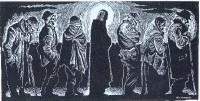

Karen House Catholic Worker
 |
Karen House Catholic Worker |
The RoundTable Economics on a Human Scale Fall 1989 Major Articles
|
Download Entire Issue by Clicking Image Above (large file - it takes a minute!) |
|||
Karen House: 1840 Hogan St. Saint Louis, MO 63106 Contact Us: 314.621.4052 |
Regular Features
|
Why This Issue: "Give us this day our daily bread." The Lord's Prayer gives voice to the simplest and most basic of petitions. Yet we seem compelled to resort to the most extraordinary means to meet the most essential needs. Do our socio-economic institutions effectively provide for our needs, and at what costs?
Visions of bushels of flawless, waxed, lustrous red apples contaminated with Alar; of huge, intricate freeway networks dogged with vehicles traveling at a walking pace every rush hour; of ominous nuclear power plants, erected at enormous public cost, standing idle due to lack of safety and need; these and similar images come to mind. Do we need all this just to have our daily bread?
We live in an age of fundamental frustrations, of confounding contradictions. We produce and store a surplus of grain in towering silos while millions worldwide are malnourished and in our own cities the souplines multiply. Modem medicine offers miracles in the treatment of life-threatening diseases, but we cannot offer adequate primary health care to the uninsured, the poor, the under- and unemployed. We police the world to insure the import of petroleum to fuel our cars, while we suffocate in our smog-polluted cities.
We are free to choose from a stupefying array of manufactured products, most of which serve no real need. At work our role in their production is so reduced, atomized, and controlled that we are robbed of any personal satisfaction in our labor. Human potential is lost when life consists in the passive consumption of commodities and treatments to satisfy manufactured needs.
How do we respond to these paradoxes? Does the solution lie in more advanced technology, in a greater division of labor, in unregulated mega--corporations, in free enterprise, in an expanded, governmental role, in socialized industries, more centralization, perhaps in world government?
In this issue we suggest that these trends are not the answer, but lie at the heart of the problem. We do not pretend to have "the solution." Although we cannot provide answers, we will try to propose directions.
Chris Montesano from Sheep Ranch Farm in California begins by reminding us that these issues are not new to the Catholic Worker; Peter Maurin had responded to them at the founding of the movement. Paul Gilk admonishes us not to idealize a primitive past. Rich Wilms, manager of the local Plowsharing Crafts, reports on artisan cooperatives around the world. Virginia Druhe demonstrates how the attempt to include work done by women in economic systems reveals a more human way to understand our economic lives. We also include a brief essay from Bolivia from Sr. Carol Donahue, the usual house articles and a "Round Table Talk" focusing on care of tile environment. Finally we felt we must pay tribute to Bolen Carter who recently died, "a pioneer of the Catholic Worker in St. Louis."
The spirituality of Dorothy Day and Peter Maurin tends to sober the hubris which humanity is prone to. There are more basic and simpler ways to provide our daily bread more in harmony with nature and with ourselves. Our socio-economic framework must be challenged at the grass-roots level by the alternatives we pursue. But beyond this a spiritual conversion is needed to heal our economic and social woes. Is it possible to find a more satisfying mode of existence? "Simplify, simplify" warned Thoreau. Readily dismissed as romantic chaff, his was an all-too-prophetic voice. |
The RoundTable is 24 pages long. To download, you'll need the most recent version of Adobe Acrobat. Download Adobe Acrobat 8 here (it's easy AND free!)
Search all of the RoundTable issues for an author, subject or title here: |